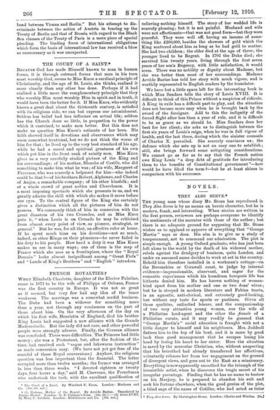THE COURT OF A SAINT.* BECAUSE God has made Himself
known to man in human forms, it is through outward forms that man in his turn must worship God, seems to Miss Knox a cardinal principle of Christianity, and the age of St. Louis, she thinks, realised it more clearly than any other has done. Perhaps if it had realised a little more the complementary principle that they who worship Him must worship Him in spirit and in truth, it would have been the better for it. If Miss Knox, who evidently knows a great deal about the thirteenth century, is satisfied with its religious side, we can but express our astonishment. Seldom has belief had less influence on actual life ; seldom has the Church done so little, in proportion to the power which it exercised, to make men better. But this does not make us question Miss Knox's estimate of her hero. His faith showed itself in devotions and observances which may seem somewhat irrational, but we do not think the worse of him for that ; he lived up to the very best standard of his age, while be had a moral and spiritual greatness of his own which put him in the front rank of saintly men. Miss Knox gives us a very carefully studied picture of the King and his surroundings ; of his mother, Blanche of Castile, who did something to make him what he was ; of his wife, Margaret of Provence, who was scarcely a helpmeet for him—who indeed could be that P—of his brothers Robert, Alphonso, and Charles of Anjou, a remarkable company; of his other kinsfolk ; and of a whole crowd of great nobles and Churchmen. It is a most imposing spectacle which she presents to us, and we greatly admire the skill with which she makes it move before our eyes. To the central figure of the King she certainly gives a distinction which all the pictures of him do not possess. We commonly think of him in connexion with the great disasters of his two Crusades, and as Miss Knox puts it, " when Louis is on Crusade he may be criticised from almost every point of view, as pioneer, strategist, or general." But he was, for all that, an effective ruler at home. If he spent much time on his devotions—not so much, indeed, as other Kings on their pleasures—he never failed in his duty to his people. How bard a duty it was Miss Knox makes us see in many ways ; one of them is the map of France which she uses as a frontispiece, where the " Royal Domain " looks almost insignificant among " Great Fiefs " and "Lands of King's Brothers" and " English " intruders.










































 Previous page
Previous page